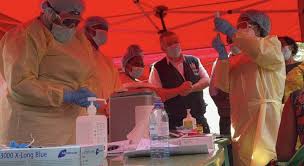
In a historic move, Uganda, in collaboration with the World Health Organization (WHO) and global partners, has initiated the first-ever clinical trial for a vaccine targeting the Sudan species of the Ebola virus. This trial was launched a mere four days after the outbreak was confirmed on January 30, showcasing an extraordinary pace for a randomized vaccine trial in an emergency context. If it proves successful, the vaccine could be vital in managing future outbreaks and obtaining regulatory approval.
Key Points:
- First-ever clinical trial for a vaccine against the Sudan species of the Ebola virus.
- Initiated within four days of outbreak confirmation on January 30, demonstrating rapid response.
- No licensed vaccine currently exists for the Sudan species, unlike the Zaire ebolavirus.
- Led by Makerere University and the Uganda Virus Research Institute (UVRI).
- Supported by WHO, CEPI, Canada’s IDRC, EU HERA, and Africa CDC.
- Vaccine donated by the non-profit IAVI.
- Ring vaccination strategy used, targeting contacts of confirmed cases.
- Strict regulatory and ethical compliance maintained.
- Results expected within months, potentially shaping future outbreak response strategies.
Ebola Virus Overview
- Discovered: 1976 in the Democratic Republic of the Congo.
- Family: Orthoebolaviruses (formerly ebolavirus).
- Origin of Name: Named after the Ebola River, near the first reported outbreak location in the DRC.
- Hosts: Primarily fruit bats (Pteropodidae family), also affects other primates and animals like gorillas, chimpanzees, monkeys, forest antelope, and porcupines.
Transmission:
- Spread through direct contact with bodily fluids (blood, saliva, sweat, vomit, feces, urine, breast milk, semen) of an infected person or animal.
- Can also spread through contaminated objects (needles, surfaces) and consumption of infected bushmeat.
Symptoms:
- Initial symptoms: Fever, severe headache, muscle pain, fatigue, sore throat.
- Later symptoms: Vomiting, diarrhea, rash, internal and external bleeding (hemorrhaging).
Treatment:
- No specific cure, but supportive care (rehydration, oxygen therapy, pain management) improves survival.
- Experimental treatments include monoclonal antibodies (e.g., Inmazeb, Ebanga).





